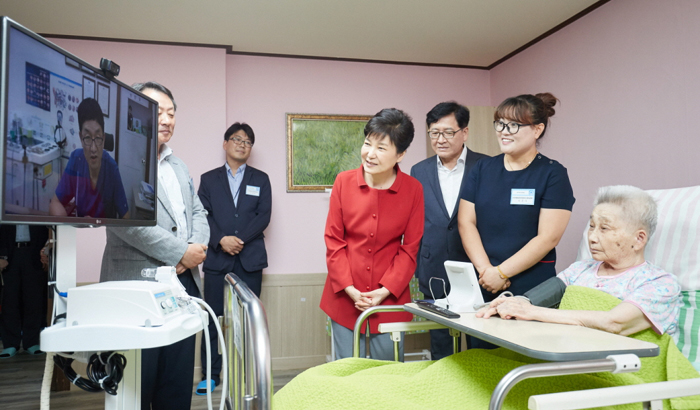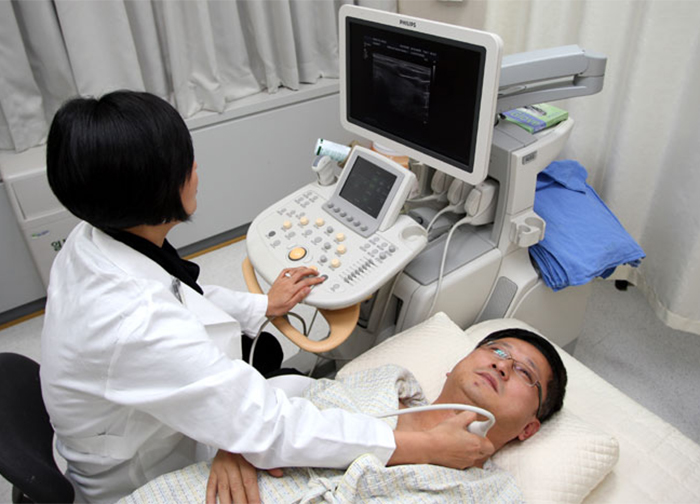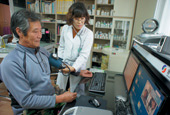
President Park Geun-hye (center) visits a medical center on Aug. 5 as a patient receives telemedicine services. The government is set to expand telemedicine services for those who have limited access to them.
Telemedicine services will be expanded for those who have less access to medical services, such as seniors, people with disabilities, serving members of the military or people who live in remote areas.
The Ministry of Health and Welfare has announced a telemedicine pilot project that will start this October that aims to expand access to telemedicine services. Under the plan, the ministry plans to raise the number of service recipients, such as healthcare facilities for seniors, soldiers and crews on board fishing vessels, and to provide telemedicine services to South Korean citizens who live in three East Asian countries, including Vietnam.
According to the plan, the ministry will increase the number of senior healthcare facilities that have access to telemedicine services to 450, from the current number of six. The number of remote areas with access to telemedicine services will be almost doubled to 20, from the current 11. Telemedicine services will also be newly available at 63 army bases, up from the existing 40 bases, and on board 14 fishing vessels, up from the current six.
The health ministry said that telemedicine helps to improve patients’ access to medical assistance and helps to remarkably enhance their health, as it is medical services that can be offered whenever the patient needs, and that it provides timely responses to various diseases. Since April last year, the ministry has operated a test program in Incheon and in Chungcheongnam-do Province, chosen remote areas, at certain army bases and onboard chosen fishing vessels.
Earlier in June this year, the ministry submitted a revised bill on medical law to the National Assembly that allows telemedicine services between doctors and patients. Currently, doctors and nurses must visit nursing homes or remote areas once or twice per month to check in-person on the physical condition of the patient or to provide medical treatment. If the bill passes the assembly, doctors will be able to use telemedicine to provide medical care and prescriptions.

In the near future, the national healthcare insurance plan will cover ultrasonic tests for pregnant women, the treatment of premature babies and patients with four major diseases. The health ministry recently decided to expand the benefits of the national healthcare insurance plan in order to help reduce the burden of medical costs for many patients.
Coverage from the national healthcare insurance plan will also be expanded to cover pregnant women, premature babies and patients who suffer from four major diseases. Starting in October this year, the national healthcare insurance plan will be applicable to ultrasonic tests, too.
In order to reduce peoples' medical costs and to expand the benefits of the national healthcare insurance plan, the health ministry decided on Aug. 5 to cover ultrasonic tests for free with healthcare insurance, and to lower other selective medical treatment costs.
Thanks to the decision, pregnant women can now benefit from the national healthcare insurance plan for ultrasonic tests, up to seven times during each pregnancy. In the past, if a pregnant woman received an ultrasonic test seven times before giving birth, they had to pay KRW 400,000 per scan, or more than KRW 1 million in total, because healthcare insurance didn't cover the cost.
The ministry’s decision will also apply to ultrasonic tests for premature babies and for patients with one of four major diseases: cancer, cardiovascular diseases, cerebrovascular diseases and rare, incurable diseases. In the case of regular ultrasonic tests of the brain for premature babies, the test used to cost from KRW 180,000 up to 250,000. However, starting this October, it will be down to KRW 15,000 thanks to the ministry’s new decision.
Regarding the four major diseases, the national healthcare insurance plan used to only cover ultrasonic tests if they were needed for a diagnosis. Thanks to this new decision, however, patients can now benefit from the national insurance plan if they receive an ultrasonic test as part of a biopsy or other medical treatment. If a patient receives a radiofrequency thermal ablation, they used to have to pay an additional KRW 200,000 or 400,000 for the ultrasonic test, as part of the treatment. Starting this October, however, the medical cost will be significantly reduced to KRW 12,000, thanks to the new healthcare insurance plan.
Finally, the proportion of selected medical treatments in every hospital will be lowered to 33 percent, from the current level of 67 percent, starting this September. In order to reduce medical costs and to offer more choices for general doctors, the health ministry decided to reduce the number of doctors who receive selective medical costs to 4,453 from 8,453, in 367 hospitals across the country.
By Yoon Sojung
Korea.net Staff Writer
Photos: Cheong Wa Dae, National Cancer Center
arete@korea.kr
